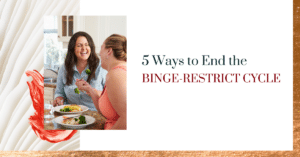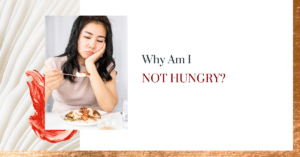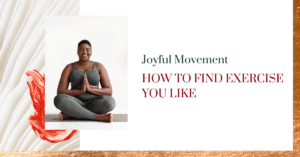What is Body Respect?

If you struggle with the idea of loving your body and find that it feels like a foreign and unattainable concept, we get it. The true goal is that you start to move from a place of body hatred to a place of body respect so that you can take care of your body both physically and mentally. Read on for more about the difference between body love and body respect, plus steps you can take to respect and take care of your body.

The language around bodies and health can be confusing and oftentimes misleading. When Alissa and I begin work with clients to heal their body image, we often hear: “It seems like I’m just supposed to wake up one day and suddenly love everything about my body – that’s never going to happen!” We’re grateful for such awesome clients who open up and share these thoughts with us because – yes, it is unrealistic!
Diet culture messages imply – or directly say – that to be healthy, to be happy and to be successful you must be thin. And while hashtags like #bodylove and #bodypositive started as a way to promote positive body image messages, at this point it often feels like these hashtags have been taken over by thin women with socially acceptable body types. This can make the idea of loving your body even more daunting.
Which is why we like to shift from thinking about loving your body to instead working on moving towards feeling neutral about your body and respecting your body. Can you move from body dissatisfaction to body neutrality? Can you spend less time thinking about and worrying about your body, even if you don’t love it looks? And can you respect your body no matter how you feel about it?
Body Love vs. Body Respect
Newsflash: you don’t have to love everything about your body and, in fact, it’s unrealistic to think we will love every single thing about our bodies. This is where body respect comes in: it is really difficult to take good care of something that you don’t respect. So rather than a goal of loving your body, aiming for body respect is more realistic and ultimately more important when it comes to taking care of yourself.
Even on the days when you may not feel your body ‘looks’ up to your standards, it’s still doing so many things to keep you alive and participating in your life. Think about all the amazing things our bodies do for us: it allows us to hug our loved ones, birth babies, participate in social activities, convert food into energy, and even just get out of bed in the morning.
These are all things that, regardless of how you feel about your body image today, your body is still doing for you or helping you do. So what does body respect look like? Here are some examples:
- Honoring your hunger signals, eating something each and every time your body tells you that it’s hungry.
- Dressing in clothes that fit and feel comfortable.
- Talking to yourself with compassion and kindness
- Moving your body in a way that feels good to you
Bodies are meant to look and be different. And regardless of what they look like on the outside, they’re doing a lot for you on the inside. Try to take some time to think about the following questions:
- How would you respect your body more if it looked differently?
- How does waiting until you look a certain way to give yourself respect align with your values?
- What would it be like to take care of your body and show it respect now, instead of waiting until you reach a certain goal?
- What would it be like to eat and move in a way that felt good instead of in the hopes of changing your body?
- What would it feel like to spend less time preoccupied with how your body looks or you wished it looked?
6 Ways to Practice Body Respect
1. Diversify your social media feed. We say this all the time over here, but diversifying the images you see and the messages you get about bodies, health, food, and beauty is a huge step towards feeling better in your body. Here are some of favorite Instagram accounts that feature a variety of diverse body sizes, shapes, ages, genders, abilities and colors.
2. Buy comfortable clothes. If your clothes (this includes underwear and bras) are tight or don’t fit well, it will be a constant daily reminder. Don’t wait until you are at a certain size to buy new clothes – dress the body that you have now. Treat your body with respect by buying yourself clothes that fit you, clothes that you like, and clothes that you feel comfortable in.
3. Practice self-care. Do nice things for your body. Think about ways that you can take care of your body, both physically and mentally. This could be meditation, deep breathing, movement, running a bubble bath, watching a favorite tv show, taking a walk with a friend, using some luxurious body lotion, or reading a good book. Check out this blog post on Building a Self-Care Toolbox for more ideas.
4. Stop body checking and comparing yourself to others. Remind yourself that you don’t know anyone else’s story. They may have the “perfect” body, but you don’t know what’s going on inside of them. We all look different and bodies come in all shapes and sizes. Body diversity exists naturally and it is a beautiful thing. Try to catch yourself when you find yourself comparing yourself to others and put the focus back on yourself.
5. Don’t tear apart your body. When you’re feeling down about yourself or your body, work on not spiraling into a negative script of things you’re unhappy with or wish to change. Instead, think about how you’d talk to and support a friend who was feeling the same way. What would you say to them? It’s likely that you’d show them much more compassion than you do yourself. Try to then show that same compassion to yourself and stop the negative self-talk in its tracks.
6. Focus on what your body does for you. What are some compliments you can give yourself that have nothing to do with what you look like? Make a list of at least 15 things that you like about yourself. If this is difficult, think about the things you love and appreciate about your friends and loved ones. When you do give compliments to others, try to do so in a way that has nothing to do with their looks or their body. Some ideas: “Your smile lights up the room!”; “You’re a great listener”; “Thank you for always showing up and making me feel heard”; “You are so fun to be around”; or “I love the way you think.”
Looking for more support with body image?
Check out my Unapologetic Eating 101 Course, an online, self-paced program to liberate yourself from dieting and make peace with food and your body.
My team and I also offer virtual one-on-one support – you can check out our virtual intuitive eating nutrition coaching packages.
My book, Unapologetic Eating: Make Peace with Food and Transform Your Life, is also a great resource that includes information, research, and reflection prompts to help you move away from dieting and come back home to your body, so you can live your most unapologetic, liberated life.
Author Bio
This article was written and reviewed by Alissa Rumsey, MS, RD, CSCS, a registered dietitian and Certified Intuitive Eating Counselor. She specializes in weight-inclusive care, intuitive eating, body image healing, mindfulness, self-compassion, and healing from chronic dieting, disordered eating, and eating disorders. Alissa holds a Bachelor’s Degree in Nutrition and Exercise Science, and a Master’s Degree in Health Communications, and is also an NSCA Certified Strength and Conditioning Specialist.
share the love

about
Alissa Rumsey, RD.
Alissa Rumsey, MS, RD, CDN, CSCS (pronouns she/her/hers) is a registered
dietitian, nutrition therapist, certified intuitive eating counselor, and the author of
Unapologetic Eating: Make Peace With Food and Transform Your Life. Alissa is
passionate about helping people reclaim the space to eat and live,
unapologetically.

A twice-a-month round-up of inspirational stories, lessons, practical tips and encouragement for living your most authentic, unapologetic life.
The Unapologetic Life
RECENT POSTS

The Unapologetic Life
A twice-a-month round-up of inspirational stories, lessons, practical tips and encouragement for living your most authentic, unapologetic life.










